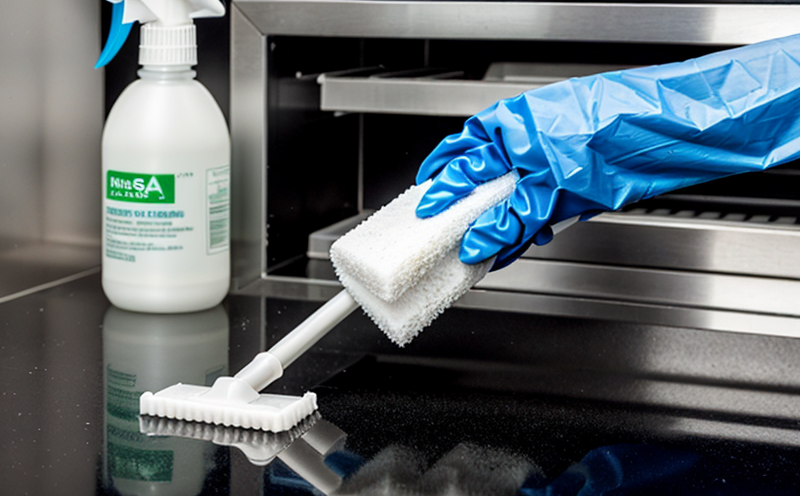ASTM E2180 Antimicrobial Efficiency Testing of Hygiene Plastics
The ASTM E2180 standard is a critical tool in the development and certification of hygiene plastics, ensuring that materials effectively inhibit or kill microorganisms. This test evaluates the antimicrobial efficiency of plastic products used in environments where hygiene is paramount, such as medical devices, food packaging, and personal care items.
The testing process involves exposing prepared specimens to specified concentrations of test organisms under controlled conditions. The effectiveness of the plastic in reducing microbial growth or killing microorganisms is then measured over a defined period. This method provides valuable data for manufacturers to ensure their products meet stringent hygiene standards and regulatory requirements.
ASTM E2180 compliance is particularly important for industries where contamination can lead to serious health risks, such as healthcare facilities. The test ensures that the plastic materials used in these environments are capable of maintaining a hygienic environment by effectively preventing microbial growth on their surfaces.
The testing procedure typically involves several key steps:
- Preparation of specimens according to ASTM E2180 specifications
- Exposure of specimens to specified concentrations and types of microorganisms
- Measurement of microbial reduction over time
- Evaluation against predefined acceptance criteria
The results from this testing are essential for quality managers, compliance officers, and R&D engineers. They help in validating the efficacy of hygiene plastics and ensuring that products meet both internal standards and external regulatory requirements.
By adhering to ASTM E2180, manufacturers can enhance consumer confidence by providing hygienic products that effectively combat microbial contamination. This is particularly important for healthcare facilities where even minor breaches in hygiene protocols can lead to significant health risks.
Why It Matters
The importance of antimicrobial efficiency testing cannot be overstated, especially in the context of hygiene plastics used in critical environments like hospitals and food processing plants. Microbial contamination poses a serious risk to public health, particularly for vulnerable populations such as patients with compromised immune systems.
ASTM E2180 provides a standardized method to assess the ability of plastic materials to inhibit or kill microorganisms effectively. This testing ensures that hygiene plastics are capable of maintaining a clean and safe environment by reducing the risk of cross-contamination. The results from this test can significantly impact the design, manufacturing processes, and regulatory compliance for products used in these critical sectors.
For quality managers and R&D engineers, ASTM E2180 compliance is crucial for ensuring product reliability and safety. By adhering to this standard, manufacturers can demonstrate their commitment to producing high-quality hygiene plastics that meet or exceed industry standards. This not only enhances brand reputation but also ensures regulatory compliance.
The test results are particularly valuable in the healthcare sector where even minor breaches in hygiene protocols can lead to significant health risks. Hospitals and other medical facilities rely on effective antimicrobial properties of their equipment and supplies to prevent the spread of infections. ASTM E2180 helps manufacturers ensure that their products meet these stringent requirements, thereby contributing to better patient outcomes.
Why Choose This Test
Selecting ASTM E2180 for antimicrobial efficiency testing offers several advantages over other testing methods. The standardized procedure ensures consistent and reliable results across different laboratories, making it easier for manufacturers to compare data and make informed decisions.
- Consistency: ASTM E2180 provides a set of clear guidelines that ensure all tests are conducted under the same conditions, leading to more reliable and reproducible results.
- Regulatory Compliance: Many regulatory bodies around the world recognize ASTM standards as authoritative. Compliance with these standards helps manufacturers meet international regulations and gain market access in various countries.
- Industry Recognition: Leading industry players often adopt ASTM E2180 for their testing protocols, ensuring that compliance is validated by recognized experts in the field.
- Customer Trust: Demonstrating adherence to this standard builds trust with customers who value hygiene and safety. This can lead to increased market share and long-term customer relationships.
The test also offers flexibility in terms of customization, allowing manufacturers to tailor the procedure to their specific product needs while still adhering to international standards. This ensures that the testing process remains relevant and effective for a wide range of hygiene plastics products.
Furthermore, ASTM E2180 is designed to be robust enough to cover various types of microorganisms commonly found in healthcare settings and food processing environments. This comprehensive approach helps manufacturers ensure their products are effective against multiple pathogens, enhancing overall product safety and efficacy.
Use Cases and Application Examples
The ASTM E2180 test has numerous applications across different sectors where hygiene is a critical concern:
- Medical Devices: Ensures that medical equipment, such as catheters and intravenous sets, remain free from microbial contamination.
- Food Packaging: Guarantees that packaging materials do not harbor pathogens that could contaminate food products during storage or transport.
- Personal Care Products: Verifies the antimicrobial properties of items like toothbrush holders and razors to prevent cross-contamination in shared environments.
- Hospital Facilities: Evaluates the effectiveness of floor coverings, wall finishes, and other building materials used in healthcare settings to maintain a sterile environment.
In each of these applications, ASTM E2180 provides essential data that helps manufacturers optimize their product design and manufacturing processes. The test results are crucial for ensuring that products meet stringent hygiene standards, thereby protecting public health and maintaining consumer trust.
For instance, in the medical device industry, compliance with ASTM E2180 can significantly reduce the risk of nosocomial infections. In food packaging, it ensures that consumers receive safe and uncontaminated products, while in personal care items, it enhances hygiene by preventing cross-contamination. These real-world applications underscore the importance of this testing method in maintaining high standards of hygiene across various industries.





